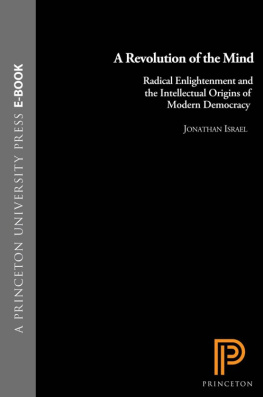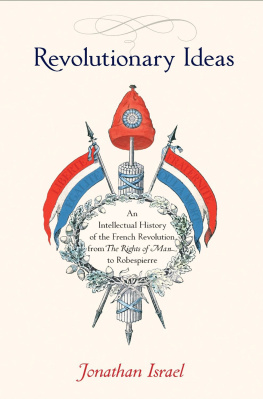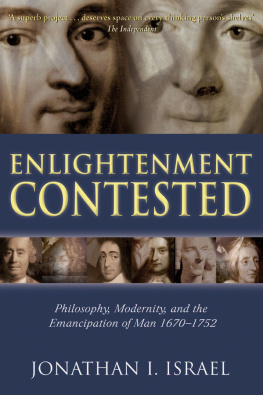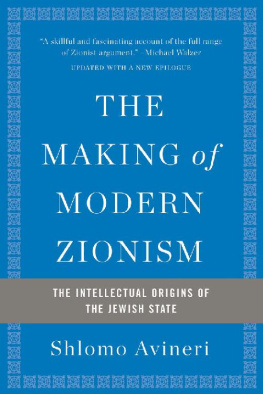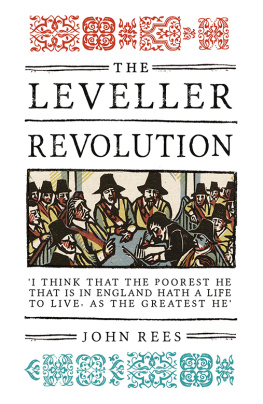Jonathan Israel - A Revolution of the Mind: Radical Enlightenment and the Intellectual Origins of Modern Democracy
Here you can read online Jonathan Israel - A Revolution of the Mind: Radical Enlightenment and the Intellectual Origins of Modern Democracy full text of the book (entire story) in english for free. Download pdf and epub, get meaning, cover and reviews about this ebook. year: 2009, publisher: Princeton University Press, genre: Politics. Description of the work, (preface) as well as reviews are available. Best literature library LitArk.com created for fans of good reading and offers a wide selection of genres:
Romance novel
Science fiction
Adventure
Detective
Science
History
Home and family
Prose
Art
Politics
Computer
Non-fiction
Religion
Business
Children
Humor
Choose a favorite category and find really read worthwhile books. Enjoy immersion in the world of imagination, feel the emotions of the characters or learn something new for yourself, make an fascinating discovery.
- Book:A Revolution of the Mind: Radical Enlightenment and the Intellectual Origins of Modern Democracy
- Author:
- Publisher:Princeton University Press
- Genre:
- Year:2009
- Rating:4 / 5
- Favourites:Add to favourites
- Your mark:
- 80
- 1
- 2
- 3
- 4
- 5
A Revolution of the Mind: Radical Enlightenment and the Intellectual Origins of Modern Democracy: summary, description and annotation
We offer to read an annotation, description, summary or preface (depends on what the author of the book "A Revolution of the Mind: Radical Enlightenment and the Intellectual Origins of Modern Democracy" wrote himself). If you haven't found the necessary information about the book — write in the comments, we will try to find it.
Jonathan Israel: author's other books
Who wrote A Revolution of the Mind: Radical Enlightenment and the Intellectual Origins of Modern Democracy? Find out the surname, the name of the author of the book and a list of all author's works by series.
A Revolution of the Mind: Radical Enlightenment and the Intellectual Origins of Modern Democracy — read online for free the complete book (whole text) full work
Below is the text of the book, divided by pages. System saving the place of the last page read, allows you to conveniently read the book "A Revolution of the Mind: Radical Enlightenment and the Intellectual Origins of Modern Democracy" online for free, without having to search again every time where you left off. Put a bookmark, and you can go to the page where you finished reading at any time.
Font size:
Interval:
Bookmark:
A REVOLUTION
OF THE MIND
Jonathan Israel
OF THE MIND
Radical Enlightenment and
the Intellectual Origins of
Modern Democracy

Copyright 2010 by Princeton University Press
Published by Princeton University Press,
41 William Street, Princeton, New Jersey 08540
In the United Kingdom: Princeton University Press,
6 Oxford Street, Woodstock, Oxfordshire OX20 1TW
All Rights Reserved
Library of Congress Cataloging-in-Publication Data
Israel, Jonathan.
A revolution of the mind : Radical Enlightenment and
the intellectual origins of modern democracy /
Jonathan Israel.
p. cm.
Includes biographical references and index.
ISBN 978-0-691-14200-5 (hardcover : alk. paper)
1. Political scienceEuropeHistory18th century.
2. Enlightenment. 3. DemocracyHistory18th
century. I. Title.
JA84.E9187 2010
321.8dc22 2009011137
British Library Cataloging-in-Publication Data
is available
This book has been composed in Minion
Printed on acid-free paper.
press.princeton.edu
Printed in the United States of America
1 3 5 7 9 10 8 6 4 2
In recent years historians and philosophers have made rapid strides in uncovering the main stages and the general history of the Radical Enlightenment. An originally clandestine movement of ideas, almost entirely hidden from public view during its earliest phase (the late seventeenth century), and maturing in opposition to the moderate mainstream Enlightenment dominant in Europe and America in the eighteenth century, radical thought burst into the open in the 1770s, 1780s, and 1790s during the revolutionary era in America, France, Britain, Ireland, and the Netherlands, as well as in underground democratic opposition circles in Germany, Scandinavia, Latin America, and elsewhere. Radical Enlightenment is now widely seen as the current of thought (and eventually political action) that played the primary role in grounding the egalitarian and democratic core values and ideals of the modern world.
Radical Enlightenment is a set of basic principles that can be summed up concisely as: democracy; racial and sexual equality; individual liberty of lifestyle; full freedom of thought, expression, and the press; eradication of religious authority from the legislative process and education; and full separation of church and state. It sees the purpose of the state as being the wholly secular one of promoting the worldly interests of the majority and preventing vested minority interests from capturing control of the legislative process. Its chief maxim is that all men have the same basic needs, rights, and status irrespective of what they believe or what religious, economic, or ethnic group they belong to, and that consequently all ought to be treated alike, on the basis of equity, whether black or white, male or female, religious or nonreligious, and that all deserve to have their personal interests and aspirations equally respected by law and government. Its universalism lies in its claim that all men have the same right to pursue happiness in their own way, and think and say whatever they see fit, and no one, including those who convince others they are divinely chosen to be their masters, rulers, or spiritual guides, is justified in denying or hindering others in the enjoyment of rights that pertain to all men and women equally.
These principles, broadly accepted nowhere in the world before the American Revolutionand by no means fully implemented there whilst slavery persisted and many whites as well as blacks and Indians remained excluded from voting and political participation in the decades after 1776are only very patchily accepted by societies and governments in much of the world today. But while in many places these core democratic values retain only a precarious foothold, they did finally triumph in much of the world after 1945. With the struggle against Fascism and Stalinism, and especially after the end of the Second World War and the commencement of decolonialization (beginning in the late 1940s), modern representative democracy and equality before the law have become generally entrenched in the legal and legislative apparatus not just of Western Europe, America, and the wider English-speaking world, but also, from the late 1940s, for the first time became firmly grounded in several key Asian countries, most notably India and Japan, at least at the level of officially approved policy, law, and education.
Surprising as it may seem, the history of this processthe gradual advance of the ideas underpinning democratic Enlightenment in the modern eraremains very little studied or known. Indeed, there exist scarcely any historical accounts that analyze and narrate the story of the origins and rise of modern equality, democracy, individual liberty, and freedom of thought in their intellectual, social, and political context. Until recently, historians of the French Revolution still thought of it (and many still do) as inventing a new form of political discourse rather than as a struggle between rival ideologies complexly evolving over the previous century. Of course, no one would deny that there exists an impressive mass of studies, especially by political and social scientists, analyzing the The story of the emergence of modern democratic core values as a Western and global historical phenomenon before 1789 remainsin America, Europe, Africa, and Asia alikea gigantic yawning gap.
The risk in considering our core values as purely abstract concepts that do not require examination in their historical context, or imagining the French Revolution invented them, is that we then remain blind to how, why, and where these concepts first emerged amid conflict and controversy, and the means whereby they slowly advanced in the teeth of widespread opposition and eventually became first intellectually and then politically hegemonic. Not only scholars but also the general reading, debating, and voting public need some awareness of the tremendous difficulty, struggle, and cost involved in propagating our core ideas in the face of the long-dominant monarchical, aristocratic, and religious ideologies, privileged oligarchies and elites, and in the face also of the various Counter-Enlightenment popular movements that so resolutely and vehemently combated egalitarian and democratic values from the mid-seventeenth century down to the crushing of Nazism, the supreme Counter-Enlightenment, in 1945.
Radical Enlightenment is the system of ideas that, historically, has principally shaped the Western Worlds most basic social and cultural values in the post-Christian age. This in itself lends the history of the movement great importance. But this type of thoughtespecially in many Asian and African countries, as well as in contemporary Russiahas also become the chief hope and inspiration of numerous besieged and harassed humanists, egalitarians, and defenders of human rights, who, often against great odds, heroically champion basic human freedom and dignity, including that of women, minorities, homosexuals, and religious apostates, in the face of the resurgent forms of bigotry, oppression, and prejudice that in much of the world today appear inexorably to be extending their grip.
It is perhaps this global dimension above all that lends the history of radical thought its continuing relevance in our time. Democratic, secular, and egalitarian ideas dismally failed to be accepted or officially sponsored in very many new countries emerging in the 1950s and 1960s through decolonization, desegregation, and the spread of anticolonialism. Consequently, there still exists relatively little understanding of the intellectual grounds of these ideals in most of the developing world while, even in the West, these values, being very recent as publicly and officially endorsed principles, remain only weakly embedded in education, the media, and in many peoples minds. Besides the urgent need to strengthen democratic awareness, it is also vital to gather from the Radical Enlightenments history how exactly the core ideas of modern Western secularism interconnect and function together socially and culturally as a set, and how, after nearly three centuries of constant and sometimes massive repression, they eventually came to be embraced (sometimes half-heartedly and incompletely) by ruling elites and the Wests legal systems. Furthermore, key teachings of the Radical Enlightenment continue to offer pertinent and unsettling lessons. Who can doubt that ignorance and credulity, identified by the eighteenth-century radical enlighteners as the prime cause of human degradation and oppression, remain still the foremost foes of democracy, equality, and personal freedom; or that an informal aristocracy, like that which arose in America, eventually nurturing vast inequality of wealth, can endanger equality and individual liberty as much as any formal nobility based on lineage, rank, and legally anchored privilege?
Next pageFont size:
Interval:
Bookmark:
Similar books «A Revolution of the Mind: Radical Enlightenment and the Intellectual Origins of Modern Democracy»
Look at similar books to A Revolution of the Mind: Radical Enlightenment and the Intellectual Origins of Modern Democracy. We have selected literature similar in name and meaning in the hope of providing readers with more options to find new, interesting, not yet read works.
Discussion, reviews of the book A Revolution of the Mind: Radical Enlightenment and the Intellectual Origins of Modern Democracy and just readers' own opinions. Leave your comments, write what you think about the work, its meaning or the main characters. Specify what exactly you liked and what you didn't like, and why you think so.

